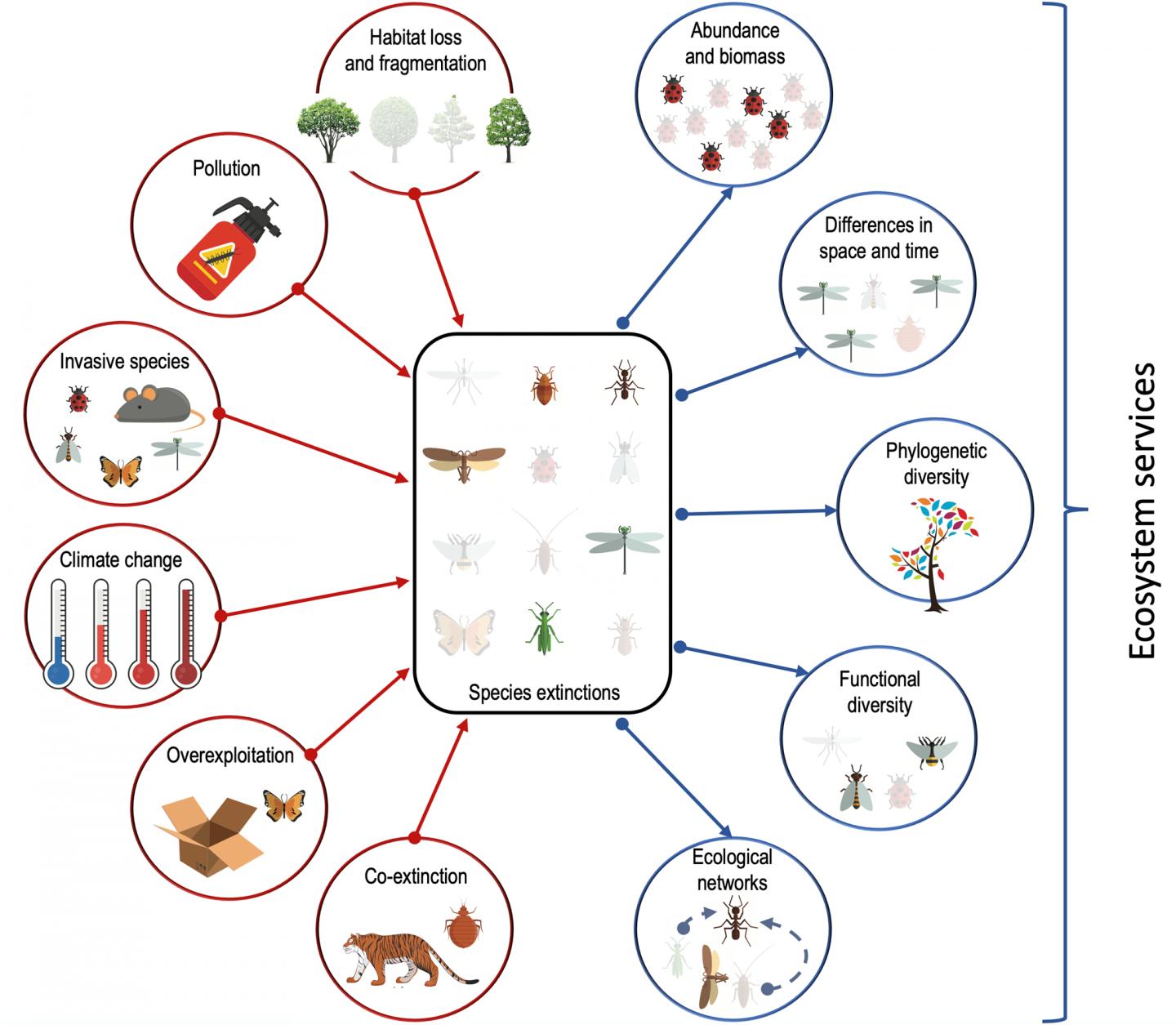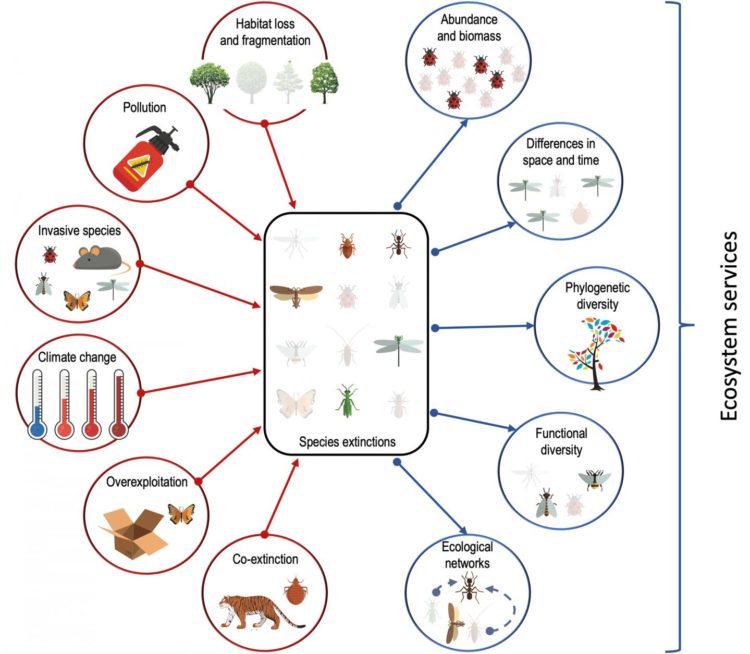They also suggest ways to recognise and avert its consequences

Credit: Pedro Cardoso
Engaging civil society and policy makers is essential for the future and mutual well-being both of people and insects. In addition to mitigating climate change, an important aspect of the solution involves setting aside high-quality and manageable portions of land for conservation, and transforming global agricultural practices to promote species co-existence.
Humanity is pushing many ecosystems beyond recovery. As a consequence, unquantified and unquantifiable insect extinctions are happening every day. Two scientific papers by 30 experts from around the world discuss both the perils and ways to avoid further extinctions, intending to contribute towards a necessary change of attitude for humanity’s own sake.
“It is surprising how little we know about biodiversity at a global level, when only about 10 to 20 per cent of insect and other invertebrate species have been described and named. And of those with a name, we know little more than a brief morphological description, maybe a part of the genetic code and a single site where it was seen some time ago,” says Pedro Cardoso, from the Finnish Museum of Natural History Luomus, University of Helsinki, Finland.
The results of recently published works make it clear that the situation is dire
Habitat loss, pollution – including harmful agricultural practices, invasive species that do not encounter borders, climate change, overexploitation and extinction of dependent species all variably contribute to documented insect population declines and species extinctions.
“With species loss, we lose not only another piece of the complex puzzle that is our living world, but also biomass, essential for example to feed other animals in the living chain, unique genes and substances that might one day contribute to cure diseases, and ecosystem functions on which humanity depends,” confirms Cardoso.
The ecosystem functions he mentions include pollination, as most crops depend on insects to survive. Additionally, decomposition, as they contribute to nutrient cycling, as well as many other functions for which we have no technological or other replacement.
Practical solutions to mitigate insect apocalypse
The researchers also suggest possible practical solutions based on existing evidence gathered from around the world, which would help to avoid further insect population loss and species extinctions. These include actions such as setting aside high-quality and manageable portions of land for conservation, transforming global agricultural practices to promote species co-existence, and mitigating climate change.
Above all, communicating and engaging with civil society and policy makers is essential for the future and mutual well-being both of people and insects.
“While small groups of people can impact insect conservation locally, collective consciousness and a globally coordinated effort for species inventorying, monitoring and conservation is required for large-scale recovery” says Michael Samways, Distinguished Professor at Stellenbosch University, South Africa.
Ideas to help insects
- 1. Avoid mowing your garden frequently; let nature grow and feed insects.
2. Plant native plants; many insects need only these to survive.
3. Avoid pesticides; go organic, at least for your own backyard.
4. Leave old trees, stumps and dead leaves alone; they are home to countless species.
5. Build an insect hotel with small horizontal holes that can become their nests.
6. Reduce your carbon footprint; this affects insects as much as other organisms.
7. Support and volunteer in conservation organizations.
8. Do not import or release living animals or plants into the wild that could harm native species.
9. Be more aware of tiny creatures; always look on the small side of life.
###
Articles:
* Cardoso, P., Barton, P.S., Birkhofer, K., Chichorro, F., Deacon, C., Fartmann, T., Fukushima, C.S., Gaigher, R., Habel, J.C., Hallmann, C.A., Hill, M.J., Hochkirch, A., Kwak, M.L., Mammola, S., Ari Noriega, J., Orfinger, A.B., Pedraza, F., Pryke, J.S., Roque, F.O., Settele, J., Simaika, J.P., Stork, N.E., Suhling, F., Vorster, C., Samways, M.J. (2020) Scientists’ warning to humanity on insect extinctions. Biological Conservation. DOI https:/
* Samways, M.J., Barton, P.S., Birkhofer, K., Chichorro, F., Deacon, C., Fartmann, T., Fukushima, C.S., Gaigher, R., Habel, J.C., Hallmann, C.A., Hill, M.J., Hochkirch, A., Kaila, L., Kwak, M.L., Maes, D., Mammola, S., Ari Noriega, J., Orfinger, A.B., Pedraza, F., Pryke, J.S., Roque, F.O., Settele, J., Simaika, J.P., Stork, N.E., Suhling, F., Vorster, C. & Cardoso, P. (2020) Solutions for humanity on how to conserve insects. Biological Conservation. DOI https:/
The studies are published open access and can be downloaded by following the DOI links above.
Bibliographic details: Pedro Cardoso
Curator at the Finnish Museum of Natural History, adjunct Professor in Ecology at the University of Helsinki. Cardoso works in global conservation science, as well as in policy and the development of new computational methods to track species extinctions. With a predilection for spiders, he quickly realized that global solutions are needed for all of biodiversity, including the small creatures that truly make the world work. He is leading the Laboratory for Integrative Biodiversity Research (http://biodiversityresearch.
Contact info: [email protected], +358294128854
Web: https:/
http://biodiversityresearch.
Twitter: @cardosopmb (personal), @libre_research (lab), @luomus,
Bibliographic details: Michael Samways
Fellow of the Royal Society of South Africa, and Member of the Academy of Science of South Africa, Michael is a Distinguished Professor in the Department of Conservation Ecology & Entomology, Stellenbosch University, South Africa. He focuses on all aspects of insect conservation, both nationally and internationally. Recipient of the John Herschel Medal of the Royal Society of South Africa, the Senior Captain Scott and Gold Medals of the South African Academy of Science and Arts, and Gold Medal of the Academy of Science of South Africa. Recipient of the lifetime Stellenbosch University Chancellor’s Award, and IUCN/Species Survival Commission Chair’s Citation of Excellence. His team, Mondi Ecological Networks Programme, won the NSTF-South32 Award. Recently, he received the Marsh Award from the Royal Entomological Society for outstanding and exemplary lifetime contribution in Insect Conservation. His new book Insect Conservation: A Global Synthesis has just been published by CABI.
Contact info: [email protected]; +27825799978
https:/
Biological Conservation is a leading international journal in the discipline of conservation science. The journal publishes articles spanning a diverse range of fields that contribute to the biological, sociological, ethical and economic dimensions of conservation.
Media Contact
Pedro Cardoso
[email protected]
Original Source
https:/
Related Journal Article
http://dx.





